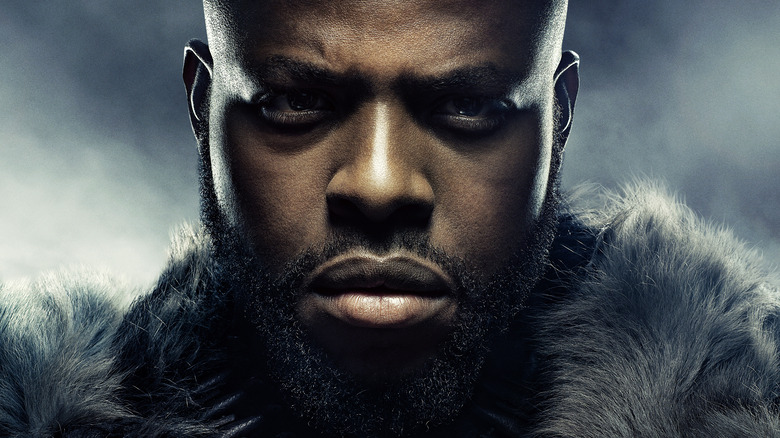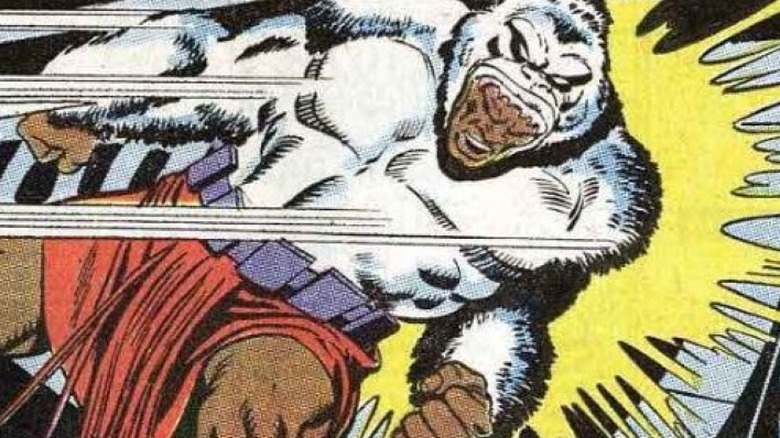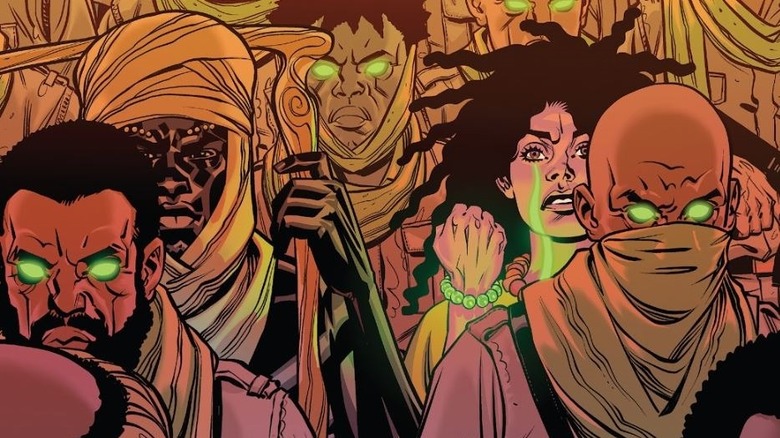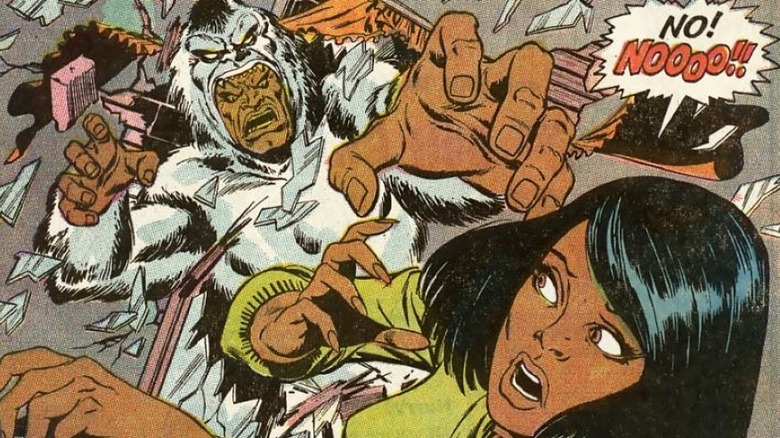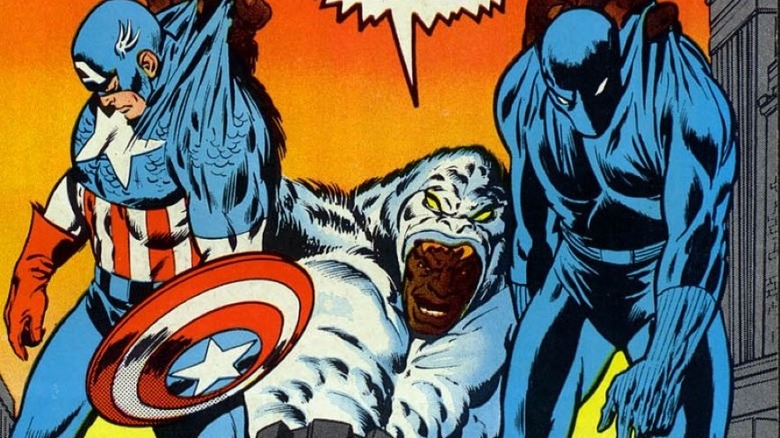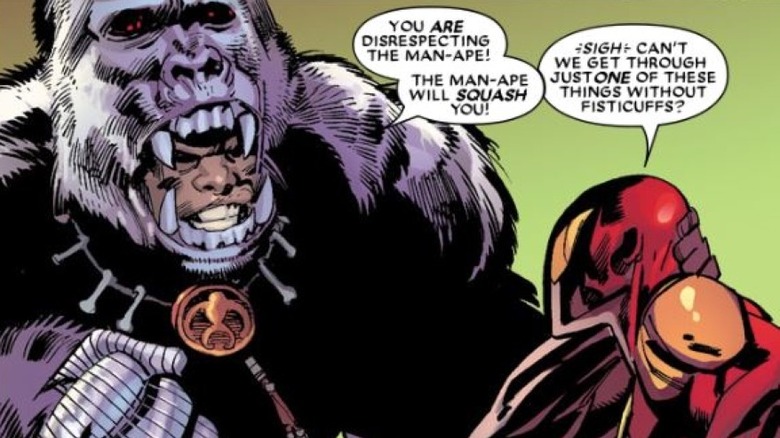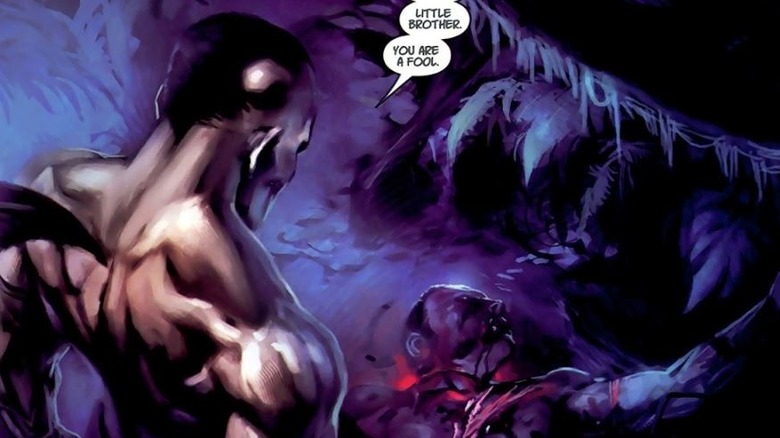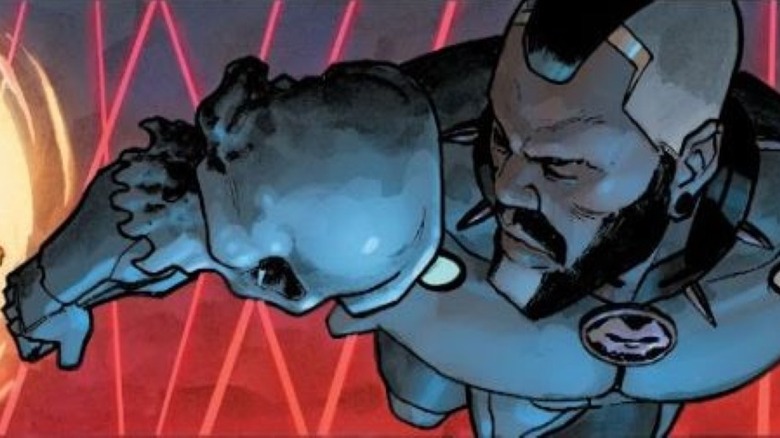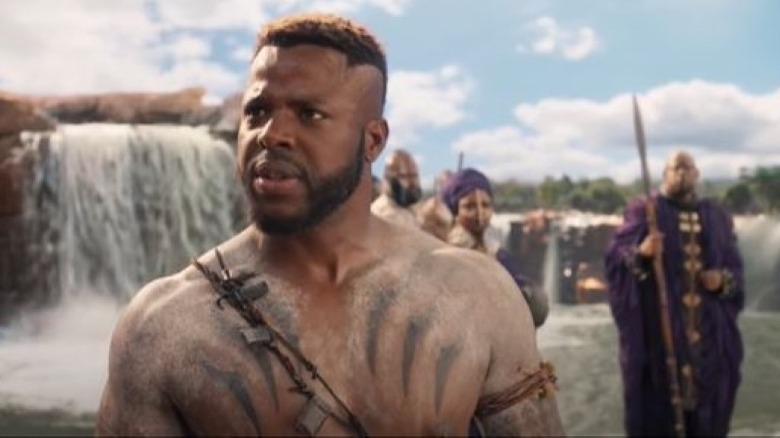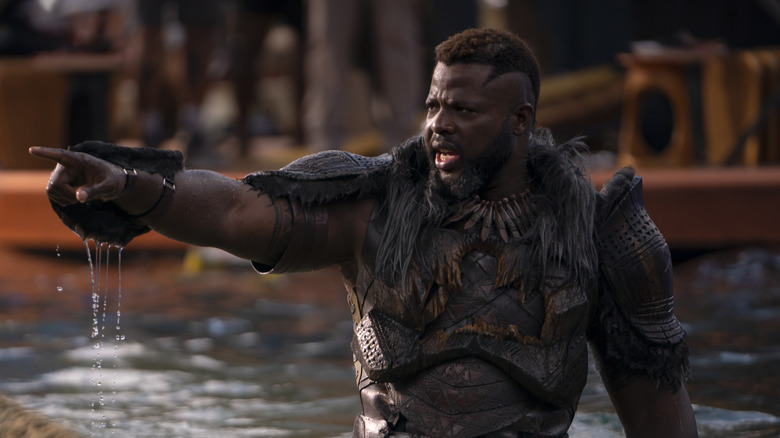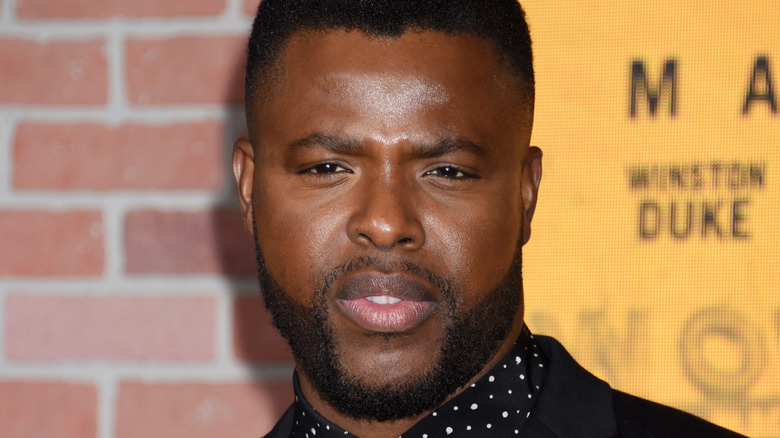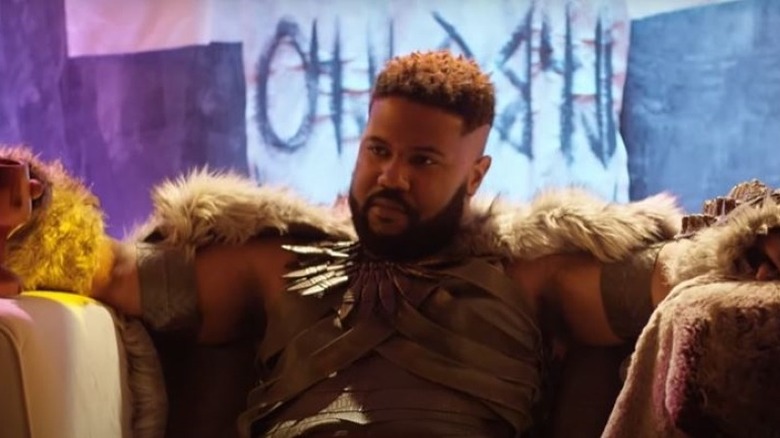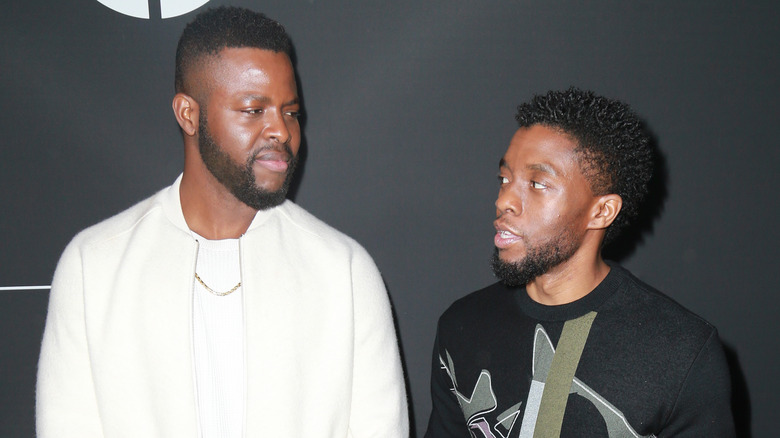Black Panther's M'Baku: What Only True MCU Fans Know About The Character
The arrival of "Black Panther" in 2018 changed audiences' perspective on a somewhat underappreciated comic book character. Chadwick Boseman's performance in the title role turned the long-time Avenger into one of Marvel's most beloved and recognizable icons. Along the way, multiple supporting characters obtained wider admiration, including Killmonger, Shuri, and Okoye. But one of the biggest surprises to come out of the isolated world of Wakanda was M'Baku, the leader of King T'Challa's rival tribe, the Jabari clan. The grizzled warrior transcended his role of opposition to become one of Black Panther's strongest allies for the fights ahead, including the Battle of Earth in "Avengers: Endgame."
M'Baku, like many of his castmates, is a character pulled directly from the comic pages into the live-action universe. Surprisingly, the man who originally challenged T'Challa for the Wakandan throne has a storied past with Black Panther that stretches back decades in the published canon. However, M'Baku underwent some significant changes for his arrival in the MCU, and becoming a fan-favorite character has made his screen portrayal more complicated. Let's explore all the details of T'Challa's brotherly rival that fans already know and appreciate.
M'Baku's first comic appearance
Soon after Black Panther clawed his way into his first appearance on the cover of issue #52 of "Fantastic Four" in 1966, the hero journeyed from his Wakanda home to join the Avengers in New York City. T'Challa made his debut on the American superhero squad in 1968's "Avengers" #52, and soon had his own roster of villains following him to the foreign nation. M'Baku was one of the first enemies directly tied to Black Panther when he arrived in "Avengers" #62 as the supervillain Man-Ape.
M'Baku is recognized as the second greatest warrior Wakanda has to offer, with only T'Challa himself superior to him. With the help of the White Gorilla Cult, M'Baku hatches a plan to take the throne for himself. Man-Ape ultimately loses this first challenge when he is crushed by the same Panther Totem which had been used to bind Black Panther. M'Baku makes his comeback later after being revived by his loyal aide, N'Gamo, remaining a thorn in the side of T'Challa and many other superheroes through his storied career.
History of the Jabari tribe
It is near-impossible to discuss M'Baku without bringing up the Jabari tribe. As the offshoot clan's leader, M'Baku represents the Jabari's differing ideals and beliefs from the dominant Panther Tribe that reigns over Wakanda. The history of Man-Ape and the Jabari tribe are fundamentally tied, and each gives context to the other. To understand M'Baku's combative and rebellious nature, a brief exploration of the literary background of the Jabari people is essential.
Creating a bond with the gorillas that naturally inhabit their territory in the forested mountains of Wakanda, the Jabari start out as a relatively minor tribe who worship the White Gorilla deity in the same way that T'Challa's family follows the Panther. Aside from differing religious beliefs, the Jabari grow to despise Wakanda's use of technology and reliance on the rest of the world, opting instead to remain faithful to more traditional practices. When T'Challa becomes king of Wakanda following the passing of his father, T'Chaka, Jabari leaders start formulating a plot to overthrow him and install themselves as Wakanda's new rulers. But they are unable to defeat T'Challa, who neutralizes the tribe by banishing its members to different parts of the country.
Origins, powers, and abilities
Although M'Baku explicitly states that he and the Jabari Tribe are vegetarians during the events of "Black Panther," the comic version of the character takes a drastically unique direction regarding diet. Revolting against the Wakandan royalty and disgruntled with their reliance on technology, M'Baku revives the rival White Gorilla Cult to directly combat the Panther following. Taking his place as their leader, the rebellious M'Baku hunts a rare white gorilla in the forests of Wakanda, subsequently eating the animal and soaking in its blood. The unsettling ceremony ultimately transfers the beast's energy to him, transforming him into Man-Ape.
M'Baku shares a similar formal military training to his rival T'Challa, thanks to being a seasoned warrior of the Wakandan Royal Militia. However, as Man-Ape he has the physical strength to lift over 2000 pounds, easily overpowering his Avenger-level king. According to the Official Handbook of the Marvel Universe, the would-be usurper's muscles are much denser than those of the average person, making him more durable and able to "physically exert himself at peak capacity" for extended periods of time. While he has increased agility and balance, they hardly rival the speedier Black Panther. A formidable powerhouse, Man-Ape has proven himself a match for some of Marvel's mightiest superheroes, including Hawkeye, Quicksilver, and Captain America.
Villain for hire
A natural antagonist who's enhanced with unnatural powers, Man-Ape became a regular inclusion on supervillain teams looking for an extra bit of muscle. Soon after his first interaction with Black Panther, M'Baku joins forces with the Lethal Legion in another attack on the Avengers. Assisted by Grim Reaper, Living Laser, Power Man, and the Swordsman, Man-Ape successfully kidnaps Black Panther once again, before being defeated by the remaining Avengers. Failing his second attempt at taking over the Wakandan throne, M'Baku is forcibly exiled from his home country.
Disgraced and homeless, Man-Ape spends his next years touring the world and taking on mercenary gigs. Most notably, he is enlisted in another incarnation of the Lethal Legion, before being temporarily hired by the Masters of Evil. Man-Ape continues after that to lend his primal strength to anyone with a sinister plan, including the short-lived Villains for Hire. Eventually landing in prison, the Wakandan villain finds himself involved in the Pleasant Hill prison outbreak. Free once more, M'Baku makes his way back into Black Panther's good graces by warning the country of a potential threat. He has since become an ally of the throne — though, like his live-action counterpart, he remains the leader of an opposing tribe.
He is an unruly wedding guest
One of the biggest events in Black Panther's comic book history is his wedding to Ororo Munroe, also known as Storm of the X-Men. The pair are one of Marvel's power couples and their marriage is a significant occasion for many of the Earth's superheroes. Members of the bride and groom's respective teams make the super guest list (via the Houston Chronicle), as well as an assortment of political leaders, celebrities, Uatu the Watcher, and others. Even Iron Man and Captain America briefly put their differences aside at the peak of their "Civil War" conflict to attend the wedding peacefully.
Unfortunately, not everyone wants to make Black Panther and Storm's marriage a tranquil event. Man-Ape, who first believes he's not invited to the king's wedding, arranges for his tribe to attack the royal celebration. Thankfully, upon learning of his inclusion, M'Baku celebrates in style, getting fully intoxicated on (one too many) glasses of scotch. Picking a fight with the scrawny-looking Spider-Man, Man-Ape instigates a brawl that T'Challa jokingly notes as marking the occasion of a true superhero wedding.
T'Challa and M'Baku: brothers?
The rivalry between Black Panther and Man-Ape expands across the Marvel multiverse. However, in one particular alternate reality, the character's connection goes beyond a physical match-up and gives them a familial bond. Marvel's Ultimate Universe, orchestrated by legendary comic writer Brian Michael Bendis, was launched in 2000 and is credited as saving the publishing company from financial ruin. Kicking off with "Ultimate Spider-Man," this alternate universe reimagined Marvel's iconic characters for a modern generation, giving many characters new origins and backstories. Notably, the Ultimate Universe gave birth to fan-favorite heroes like Miles Morales, while many of the stories have been adapted for the MCU.
More relevantly, Black Panther received a significant revamp for the Ultimate timeline. Chronologically, Wakanda's royal son first appeared in "Ultimate Captain America Annual" #1, where he challenges the "Trial of the Panther" in hopes of becoming the nation's new champion. Tested with hunting a wild panther, T'Challa almost loses his life to the beast before being rescued by his older brother M'Baku, who believes he would fare better at the challenge. Unfortunately, T'Challa is so badly injured that his father is forced to send him to America for life-saving surgery at SHIELD's Weapon X program. Meanwhile, M'Baku is disgruntled enough with not being chosen to take the trials and his father's reliance on SHIELD's help that he abandons Wakanda, later returning to challenge for the throne.
Leader of the Intergalactic Empire of Wakanda
While it has been a troublesome road for M'Baku in Marvel's main universe of Earth-616, the exiled Wakandan does find his way back into the good graces of his king. However, things have become much more complex for the high-tech nation. In search of the source of the vibranium that has helped develop Wakanda into the unique nation it has become, space explorers Alpha Flight discover a temporal anomaly. Discovering a new planet where time moves slower than Earth, Wakandan settlers claim their new home in the name of their king. Over the course of thousands of years, the civilization expands across multiple galaxies, losing touch with their origins and developing what is now recognized as the Intergalactic Empire of Wakanda.
The ancient galactic empire eventually concedes control to the Earth-bound kingdom of Wakanda, and a space-born version of M'Baku personally crowns T'Challa as their undisputed king. The alternate M'Baku returns to space, becoming an invaluable warrior for the Intergalactic Empire. It's his actions that lead to peace with a rival empire, the Shi'ar. Although reluctant, M'Baku accepts T'Challa's request and is subsequently appointed Regent of the Intergalactic Empire of Wakanda.
Adapting the controversial comic character
While unintentional by his creators, the basis of M'Baku's appearance and superpowers are clearly controversial. The moniker of Man-Ape alone presents many contentious issues, never mind an outfit that dresses the tribal leader as a giant gorilla. But M'Baku is one of Black Panther's oldest and most famous antagonists from comic book lore, so instead of abandoning the powerful rival because of his problematic design, Marvel Studios opted to give M'Baku a revamped style for the 2018 "Black Panther" film and subsequent appearances.
"We don't call him Man-Ape. We do call him M'Baku," stated executive producer Nate Moore in an interview with Entertainment Weekly. "Having a black character dress up as an ape, I think there's a lot of racial implications that don't sit well," said Moore of the self-evident issue. "But the idea that they worship the gorilla gods is interesting." Taking inspiration from the Christopher Priest run on "Black Panther," M'Baku is represented as the leader of a rival Wakandan clan. "M'Baku is essentially the head of the religious minority," said Moore. "Wakanda is not a monolithic place. They have a lot of different factions."
Real-world inspiration
It was not only comic books that inspired how M'Baku and the Jabari tribe were portrayed onscreen; much of their design and theology is based on real-world African communities. "When you go to countries in Africa, you'll find several tribes who speak their own languages, have their own culture, and have distinct food and way of dress," director Ryan Coogler told EW. "They live amongst each other, and together they make the identity of those countries." The Jabari are as much a part of Wakanda as the royal family and it is those differing ideologies that give depth to the nation, instead of focusing on one metropolis.
"M'Baku is inspired by the Dogon tribe," stated Ruth E. Carter, costume designer for "Black Panther," in an interview with The Mary Sue. Taking into account ceremonial garb and the colder mountain climates, Carter gave M'Baku and the Jabari grass skirts and leather fittings. Additionally, as woodsmen, many of the Jabari warriors sport a specific type of armor. "They believe in wood as opposed to vibranium." Carter says. "When you combine the Dogon look with the heavy wood, this really sealed the deal to show how this tribe was very different from Black Panther." Meanwhile, M'Baku's Man-Ape origins are showcased through fur coverings, specifically around the shoulders, giving the actor the feel of a silverback gorilla while avoiding a more controversial design.
Winston Duke wanted to be the villain for Black Panther 2
The film version of M'Baku was introduced as a villain, challenging Chadwick Boseman's T'Challa for the throne of Wakanda. While the antagonist origin is more in tune with the comic book version, M'Baku soon joins his enemy's side in fighting Killmonger's coup, and later, the attacks by the legions of Thanos in "Avengers: Infinity War" and "Avengers: Endgame." However, before Chadwick Boseman passed away, which changed the trajectory of the "Black Panther" sequel's plot, there were discussions over who should be the next villain. Winston Duke, who portrays M'Baku, revealed that he wanted to be the Panther's next big-screen antagonist.
"[M'Baku] is a hero," said Duke in a 2020 interview with Screenrant, "But he has so much going on. I think what makes a really great villain is that they have the power of seeing things their own way, and they can define their own circumstances." The actor goes on to point out two of the MCU's most complex villains, Loki and Thanos, and how their unique visions of justice shaped them into memorable antagonists. Unfortunately, audiences will not get the chance to witness a second round between Chadwick Boseman's Black Panther and M'Baku. But the Jabari tribe's beliefs could see them take another stab at the throne, with T'Challa's passing becoming a central plot point of "Black Panther: Wakanda Forever."
The M'Baku fan-made short film
Undoubtedly, M'Baku was one of the most interesting inclusions in the first "Black Panther" film. The complex rival to the title character gave Wakanda and the film a contrast to the royal family. Meanwhile, Winston Duke's portrayal was widely considered a breakout performance. It is no wonder that M'Baku became a fan favorite and inspired cosplayer Andre Johnson to dress as the character for years. Johnson took his love for the character even further by writing a script for a short film about Wakanda's rebellious tribe leader.
Johnson crowdsourced the $1,200 to produce the fan-made feature, "M'Baku From the Mountains," in 2021. Released by his own Andre Johnson Studios, the 13-minute movie dives into the character's decisions leading up to his challenging of T'Challa for the throne. While the film may not be an official Marvel product, the impressive feature does remain faithful to the comic and cinematic versions of the character while offering some depth to M'Baku's strengths and weaknesses.
Winston Duke's heartfelt letter to Chadwick Boseman
"How do I start to honor a man who I saw as a giant in many ways; with whom I thought I had so much more time," begins an Instagram post from Winston Duke, after learning that his good friend and co-star Chadwick Boseman had passed away at the age of 43. The man who brought Black Panther to life in the MCU was an inspiration for Duke: "Chadwick was a lightning rod for me," he wrote. "He gave me direction. When I saw '42,' I said, 'I could be this guy.'" More than a muse, Boseman was a leader and a teacher for Duke, along with the rest of the "Black Panther" cast. "He created a space for all of us to feel safe, open, and bold," said Duke, expressing his deep gratitude for Chadwick's guidance and calm confidence.
Much of what inspired "Black Panther: Wakanda Forever" is based around the cast and crew's grief and mourning for their leading man. Duke and the cast have paid tribute to Boseman on and off screen. "I knew I belonged because I could see myself in you," read Duke's touching words. "That's what heroes do. They seem familiar because they make it possible for us to see our potential best selves demonstrated through them." Rivals on film, friends in real life, Duke's words of mourning add weight to one of Hollywood's most tragic losses while giving audiences an insight into the camaraderie of these two performers.
